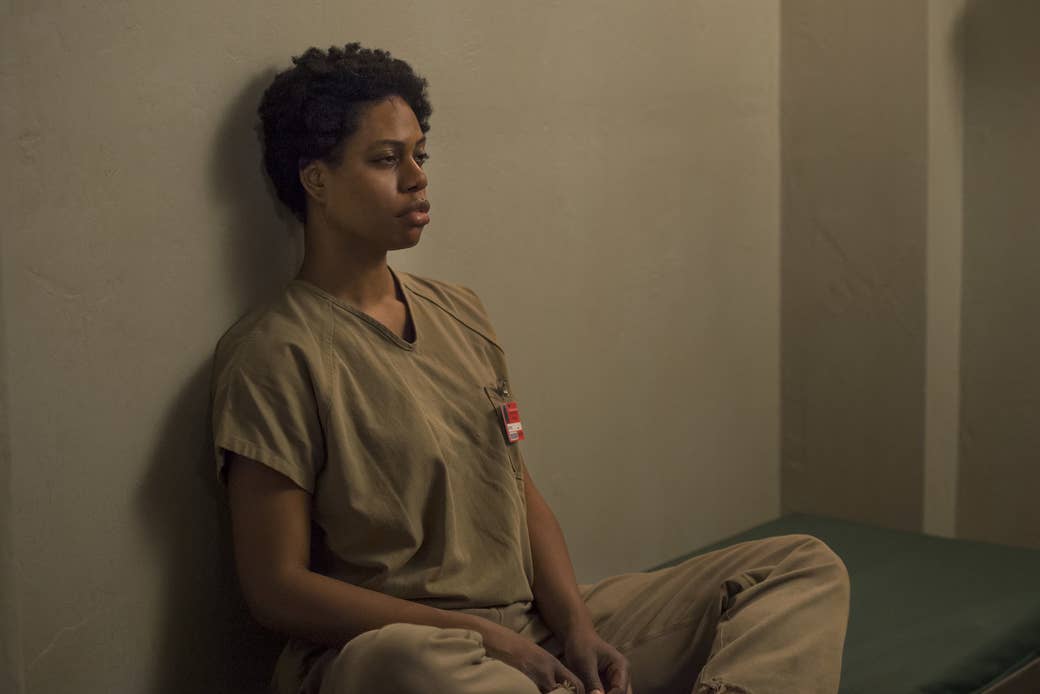
Litchfield Penitentiary has by no means reflected a glossy idyll of prison life on Orange Is the New Black, but for her first two seasons, Sophia Burset — a black transgender inmate played by Laverne Cox — seemed to have figured out how to do her time without conflict.
That changed in Season 3 of the Netflix drama, when the clashes between Sophia and fellow inmate Gloria (Selenis Leyva) revealed an ugly, violent transphobia latent among some of the prisoners that resulted in Sophia being put in the SHU, the prison's solitary confinement. It was, in theory, for her protection; the results, however, were inhumane.
In a telephone interview with BuzzFeed News, Cox said that she had both dreaded and welcomed the brutal turn in Sophia's story. "This is the violence we experience in our lives," she said. "It's real. It's hard for me, and it's triggering for me, to have to be assaulted: I've experienced violence in my own life, so to have to re-experience that on camera is not the most pleasant experience. But it's a beautiful thing when we can illuminate the truth."
The fourth season of Jenji Kohan's Orange Is the New Black, which went up on June 17, sees less of Sophia, but her storyline remains crucial. Cox talked to BuzzFeed News about struggling to put herself in Sophia's place, what she drew on to do it, and her Orange Is the New Black future. (Warning: There are spoilers for the fourth season throughout.)
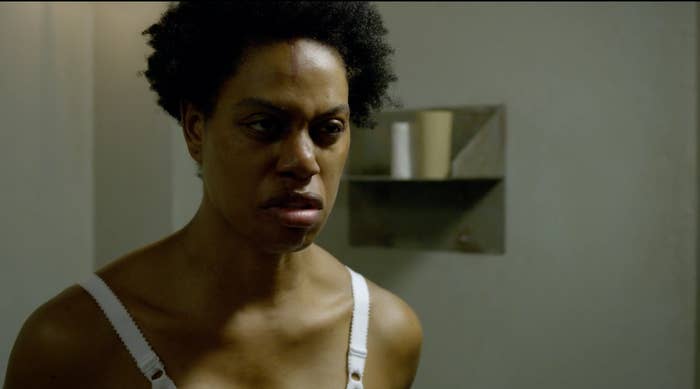
1. Cox barely interacted with the cast at the beginning of Season 4, which helped to put her in Sophia's isolated mindset.
In Season 3 of Orange Is the New Black, the escalating tensions and increasingly toxic misunderstandings between Sophia and Gloria were a central plot. In the fourth season, it's the absence of Sophia that infuses a sense of dread — both among her friends and family, and in the viewer.
When we finally do see Sophia in Episode 4, she is in desperate shape. On a surface level, she is without her armor: her perfect makeup and carefully styled wig. She's ready to cause floods and set fires if that's what it takes to draw attention to her plight, and to make Litchfield's newly named warden, Caputo (Nick Sandow), remember what these circumstances — imposed by the corporation that owns the prison — are doing to her.
"Sophia is a fighter, and I love that fight about her," Cox said about Sophia's extreme measures of protest. But that combative spirit is not to last — it can't in solitary confinement. "I understood from my research that people who are in solitary become delusional," Cox said. "You start having visions of things that aren't there; you're paranoid. You lose all sense of time, and you also lose the sense to want to live."
If Sophia was once central to the social fabric at Litchfield, in Season 4 she is alone — and Cox's acting experience reflected that. For her first few episodes, she barely saw the cast, and she even filmed her first episode off-site because of safety concerns over the scene in which Sophia uses stuffing from her mattress and a lightbulb in her cell to start a fire.
"I'm completely and utterly isolated," she said. "And that really helped everything that Sophia was going through."
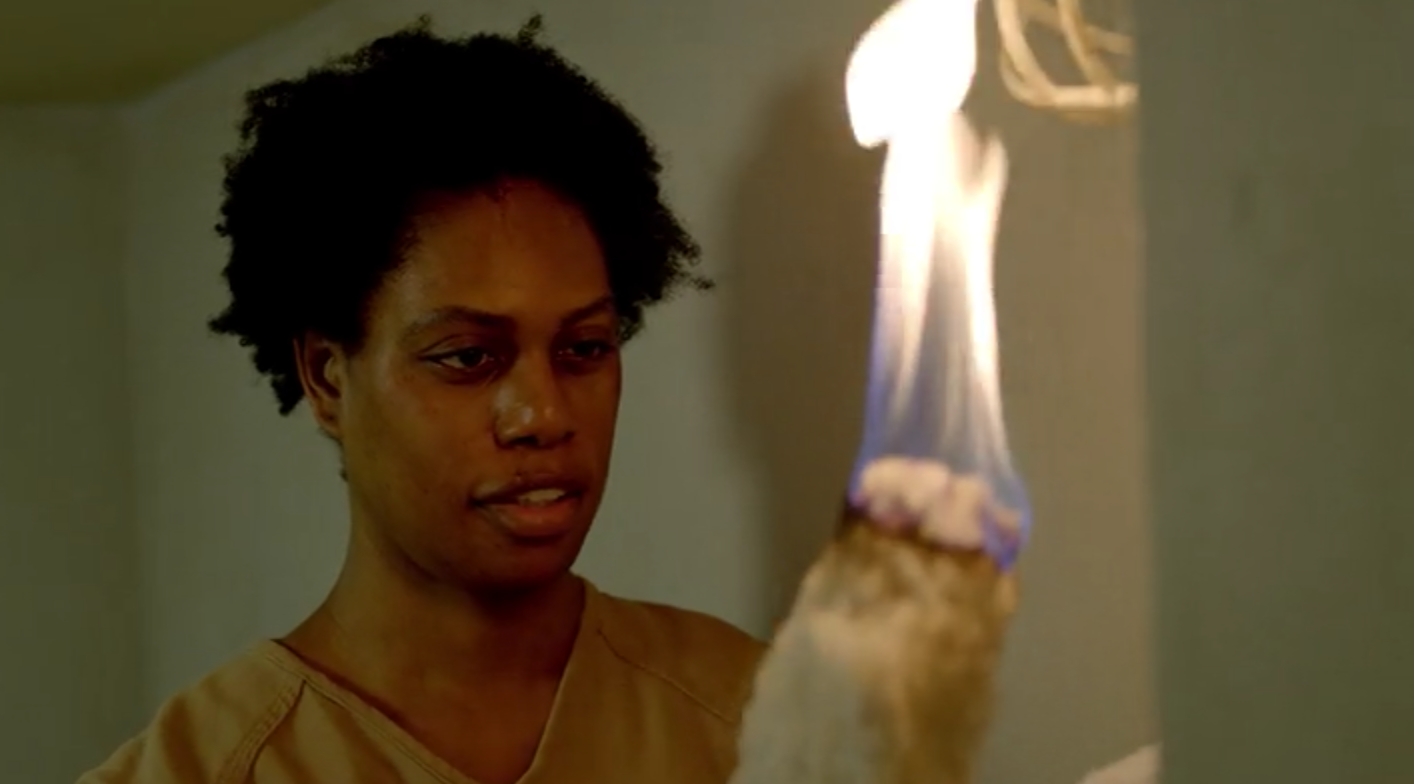
2. To accurately portray Sophia's descent, Cox in part drew upon the knowledge she had acquired while making the documentary Free CeCe, about CeCe McDonald.
McDonald, a black trans woman, was imprisoned for 19 months in a men's facility after she pleaded guilty to manslaughter; she had defended herself during an assault that has been widely reported to have been a hate crime. Cox is an executive producer of Free CeCe, which premiered earlier this month at the Los Angeles Film Festival, and she interviewed McDonald on camera while she was in prison.
"In our film, CeCe talks very candidly about her experience of being in solitary, and becoming suicidal after being cut off from all contact with the world," Cox said. "We obviously know that's what happens to my character later in the season."
Yes, once Sophia is transferred to solitary confinement in the maximum security prison after setting the fire, her downward trajectory becomes dire. And Orange Is the New Black, never a show to sugarcoat grim realities, reveals Sophia at her lowest ebb. "This is the experience that too many people are experiencing in prison now," said Cox. "Human rights activists agree that solitary is cruel and unusual punishment, which is a violation of the Eighth Amendment of our Constitution. This is something that should not ever happen to a human being."
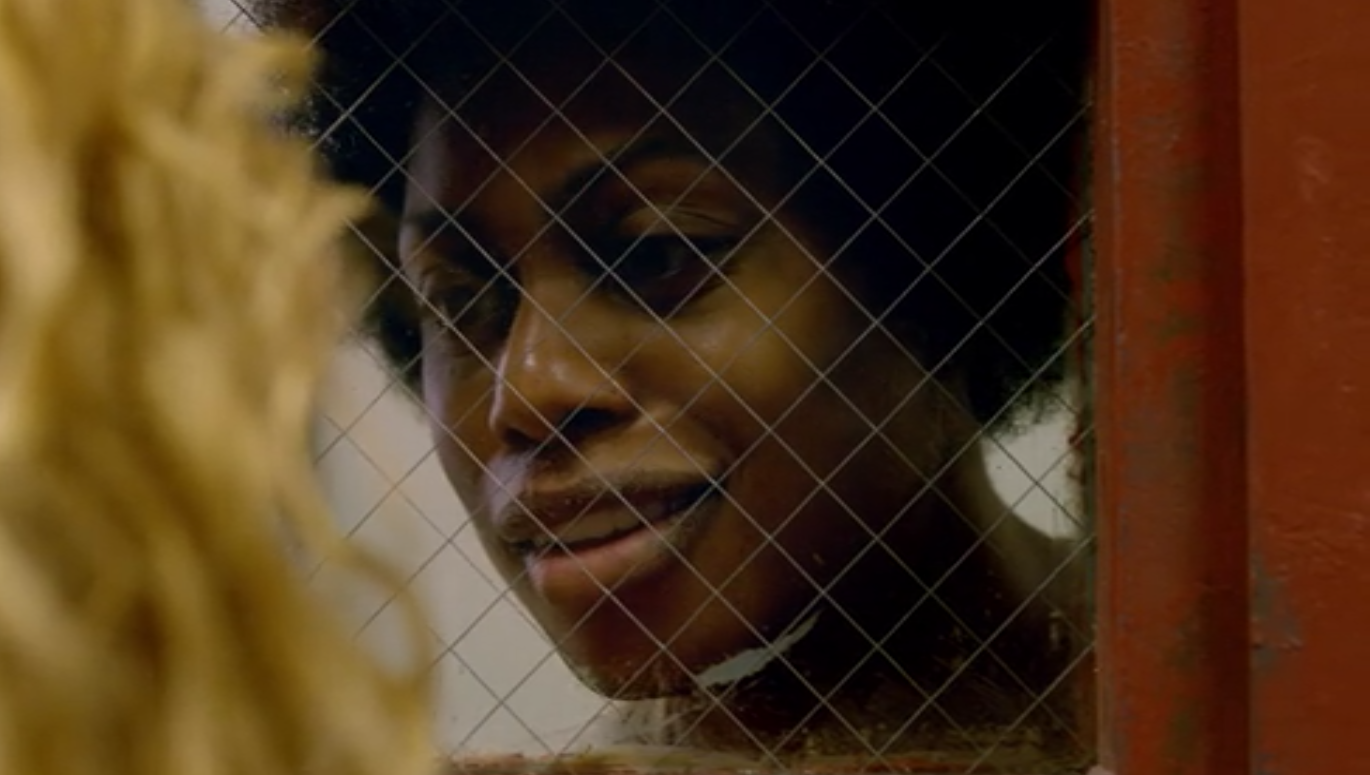
3. Portraying Sophia's suicide storyline was particularly harrowing for Cox, who attempted suicide as a child.
In Episode 6, titled "Piece of Sh*t," Nicky (Natasha Lyonne), whose job at the maximum security prison is to mop the hallways, comes across Sophia in her solitary cell. Sophia begs Nicky for a blanket. "I'm not sleeping," she says to her in despair. "I'm going to lose my mind if I don't get some rest." Then, Sophia adds forebodingly: "And we both know what happens if you go insane in this place, right?"
Later in the episode, when Nicky returns to mop, a guard tells her to clean up Sophia's cell — where we see blood smeared on the walls and floor.
Cox has spoken publicly about her own suicide attempt. To reopen those wounds as Sophia was, she said, "weird and scary, and just strange and bizarre."
"Getting into that suicidal headspace is a mindfuck," Cox said. "When having to do that take after take after take for several hours, it doesn't just go away when you go home. There was a lot of care that I had to talk with myself so that those suicidal thoughts didn't come back. Memories and trauma exist in specific places in our bodies. And the great thing about being an actor is we can bring up those traumas. But it was really important to remind myself that it's not real. This is something that I created and imagined, and these are imaginary circumstances that are created by Jenji and this show that I'm on."
Even so, she said: "It's hard to watch."
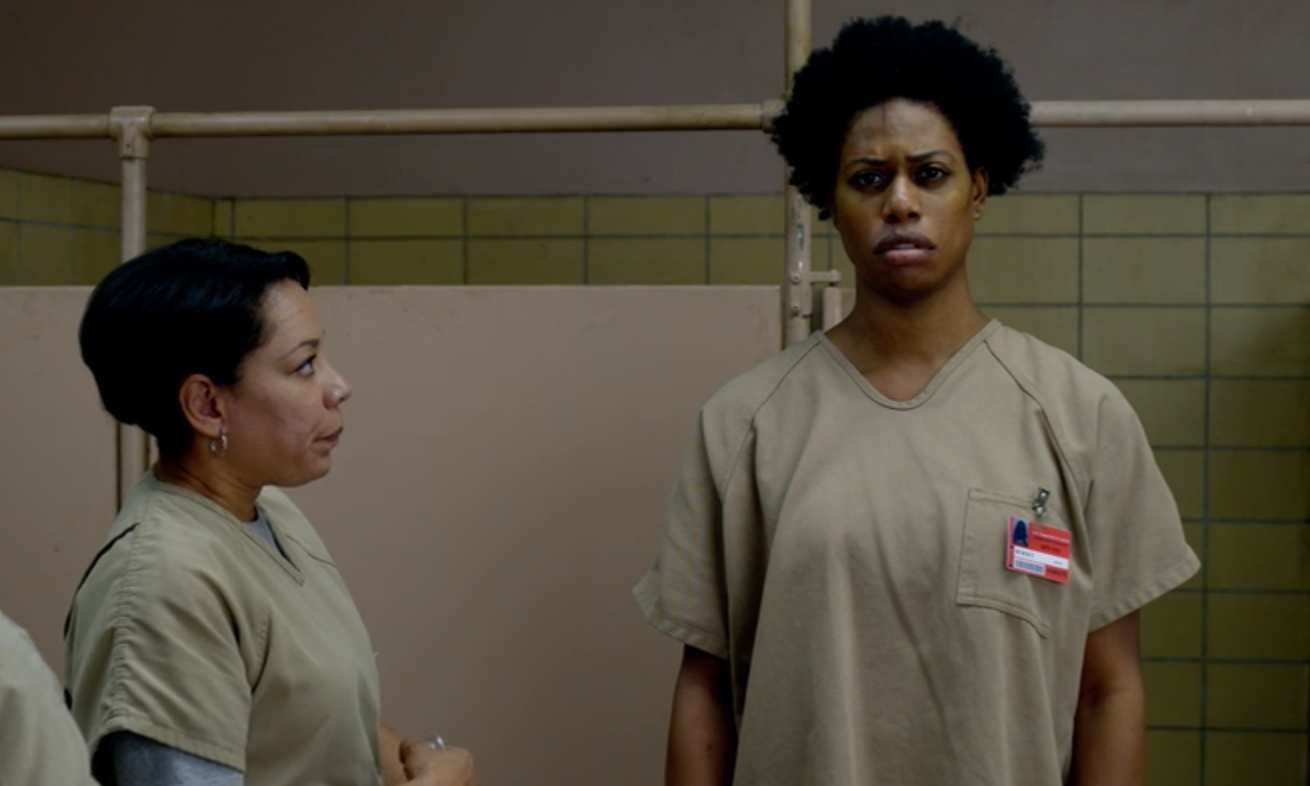
4. The first scene between Gloria and Sophia after she gets out of solitary in Episode 12, "The Animals," was one both Cox and Leyva questioned.
Sophia's Season 4 arc, or her "journey," as Cox put it, was to "fight when it was appropriate," and then to be "completely worn down and completely broken by it." She is released from the SHU after Caputo takes a picture of her in isolation that he then leaks. Cox said Mad Men creator Matthew Weiner, who directed "The Animals," told her, "This is when Sophia comes back to life."
It's Gloria who first reaches out to help Sophia — but Sophia isn't ready yet, telling her to "get the fuck out of my face." It was an exchange both actors questioned, Cox said, not thinking their characters would behave that way. "And Matthew was like, 'Well, this is the story we're telling.' So I had to let go of what I thought Sophia would do and tell the story that Matthew was trying to tell."
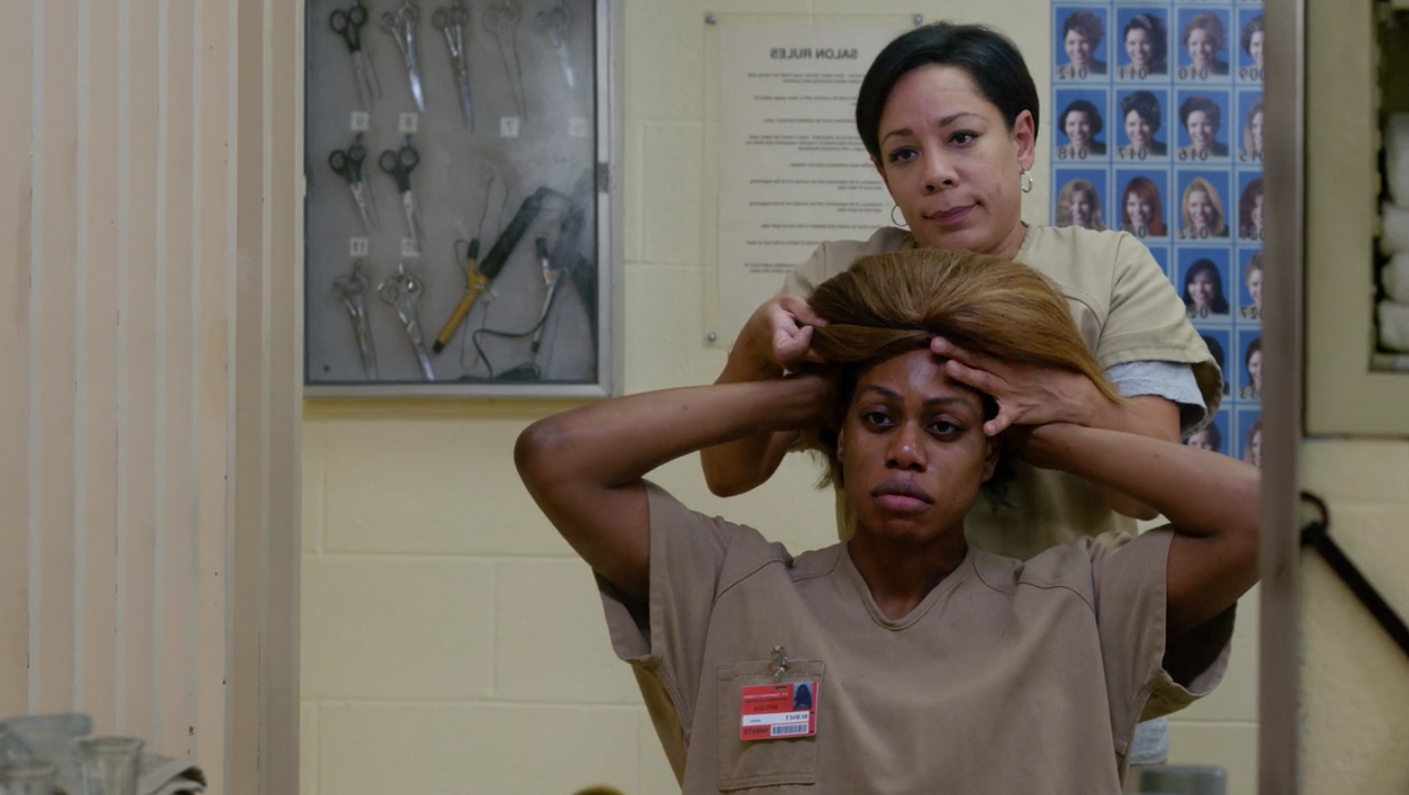
5. Leyva and Cox's relationship was integral to being able to tell Sophia's story for the past two seasons.
"I love Selenis so much," Cox said. "And you have to really love and care for someone to go to the places that we've gone to together, to fight like we fought last season and know it's going to be OK. The text messages I would send to her — I would check in later: 'Are you OK?' She was like, 'Are you OK?' It's all very intimate stuff."
When Gloria and Sophia do reconcile later in "The Animals," it is an emotional scene, focused on a seemingly small thing: whether Sophia's wig will still fit her. Her appearance is crucial to her identity, and Gloria knows that. She brushes out the wig for Sophia, who allows Gloria to take care of her. It's the best way for Gloria to apologize, and a lovely, moving visual demonstration of how they once again understand each other.
"I was just like, this is maternal. It's sisterly. It's care and nurturing," Cox said of the scene. "You don't even have to say it; it's the action."
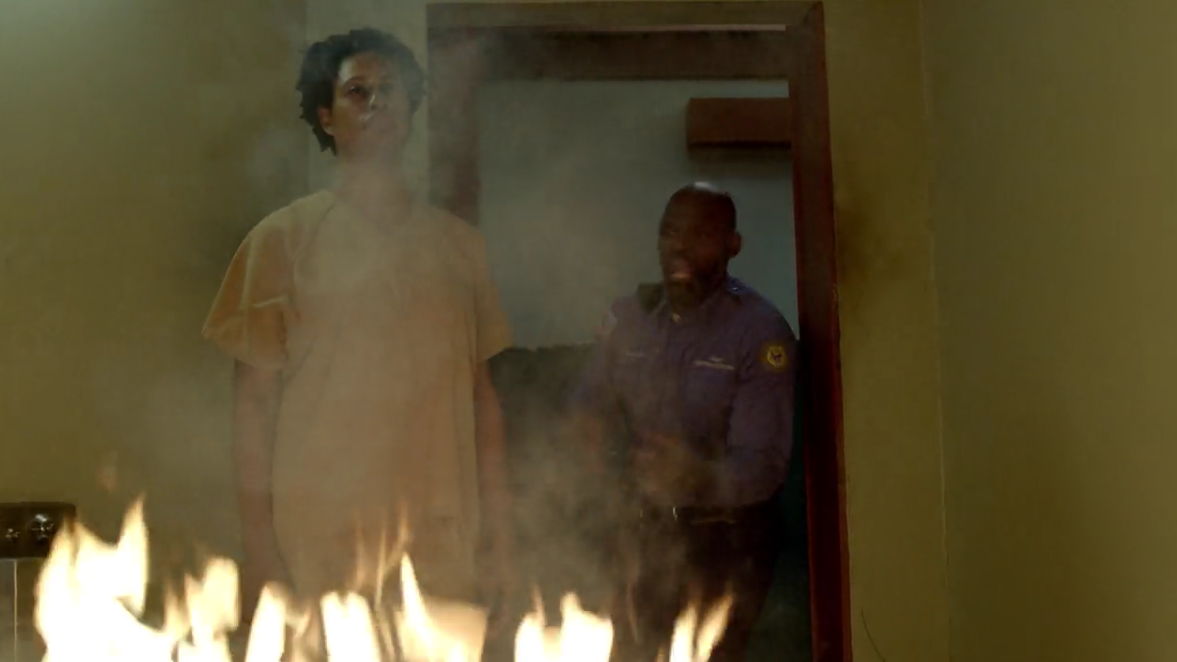
6. The theme of Season 4 of Orange Is the New Black is Black Lives Matter, and Sophia's story is an important part of that.
At one point during what Cox called "Piper's white power journey," the white supremacist inmates chant "white lives matter!" "Which," Cox said, "is obviously ironic and disturbing and hilarious." It also foretells the tragic death of Poussey in "The Animals" during a peaceful protest over the guards' treatment of the inmates.
And in the true meaning of matter, we also see that Sophia's allies actually succeed in helping her, offering the audience a glimmer of hope.
"I got really emotional earlier when I was thinking about every time Tanya Wright, who plays my wife, is banging on Caputo's door, and saying, 'Where is my wife? We need to know where she is!'" Cox also mentioned the extremes Sister Ingalls (Beth Fowler) goes to — getting placed in the SHU with a camera phone hidden in her vagina — to try to get proof of Sophia's circumstances.
"That all these people going to bat for a black transgender woman who's incarcerated reminded me of CeCe, and all the people who did that for her," Cox said. "And all the trans women who are incarcerated who don't have people on the outside advocating for them. It felt revolutionary to see that dramatized. This black trans woman matters."

7. That Cox has broken down so many barriers as a black trans actor is both a personal and a political victory.
She's been on the cover of Time magazine. She was the first openly transgender actor to be nominated for an Emmy. And soon, she will be the first transgender series regular on network television, on CBS's forthcoming Doubt. (If fans are wondering how Doubt, which will film in Los Angeles, will affect her New York-based work on Orange Is the New Black, Cox said that Sophia will not disappear again. "I'm so blessed that my Orange family wants me — and I want my Orange family," she said. "So we're figuring that out right now.")
Cox knows that her professional achievements are important to her and have a larger significance to the world. "I've always had a sense of history," she said. "I grew up idolizing women like Leontyne Price and Marian Anderson and other black artists who broke barriers."
"But all I'm really doing is doing what I love," Cox continued. "I love acting, and I've committed and sacrificed a lot to be an actor. I think when you choose to be an artist, it's a huge sacrifice."
Because of her unique position, Cox feels a sense of responsibility and wants to "give back." She said, "I'm vocal about the things that I'm passionate about, and I speak out about them."
